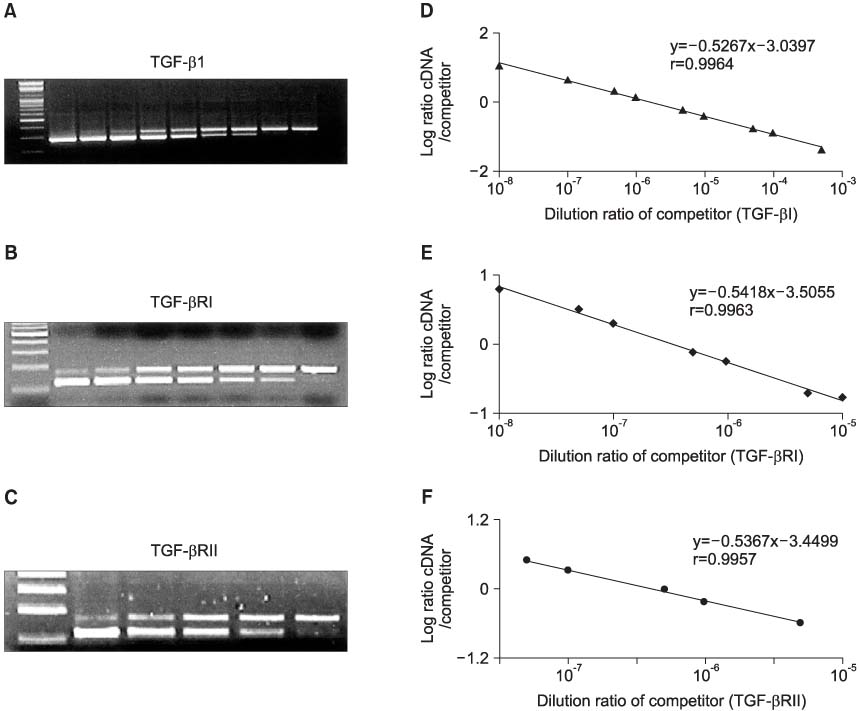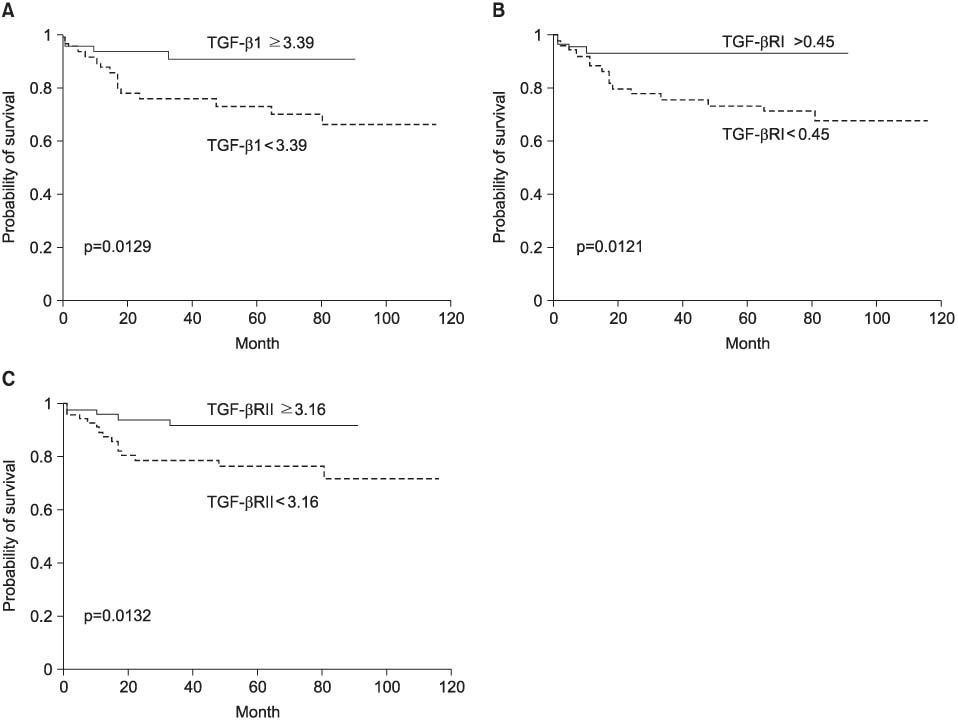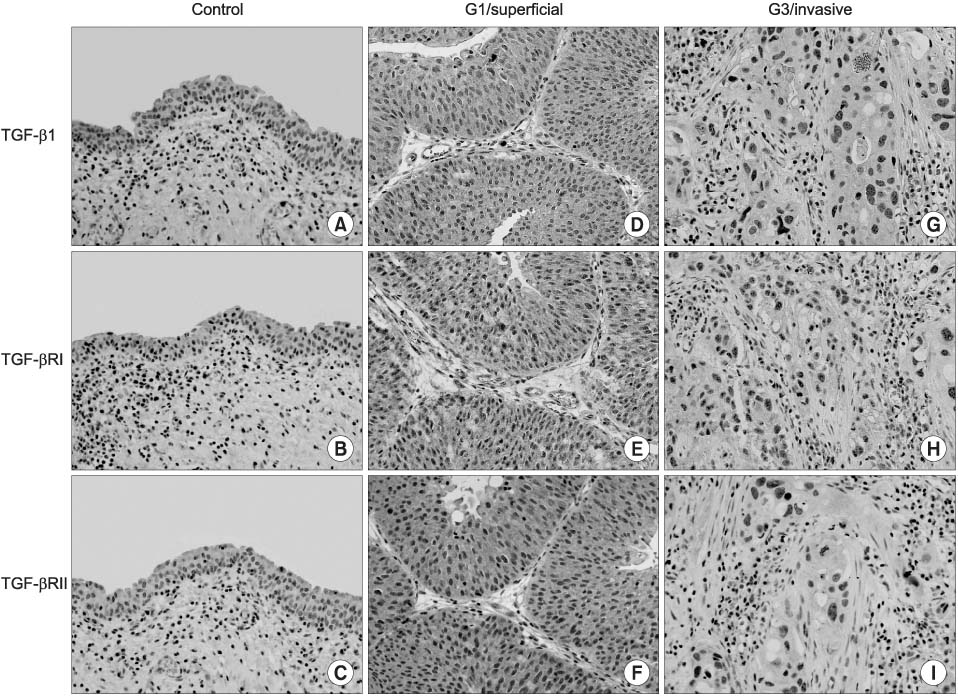Korean J Urol.
2006 Apr;47(4):426-435. 10.4111/kju.2006.47.4.426.
Effects of Transforming Growth Factor-beta1 and Its Receptor on the Development, Recurrence and Progression of Human Bladder Cancer
- Affiliations
-
- 1Department of Urology, College of Medicine, Chungbuk National University, Cheongju, Korea University, Cheongju, Korea.
- KMID: 1997155
- DOI: http://doi.org/10.4111/kju.2006.47.4.426
Abstract
- PURPOSE
We investigated whether the expression levels of Transforming growth factor beta1 (TGF-beta1) and its receptors were related to the development, recurrence, progression and disease-free survival in the patients with bladder cancer.
MATERIALS AND METHODS
The mRNA levels of TGF-beta1 and its receptors were examined in 102 tumor specimens from patients with primary bladder cancer, 29 corresponding normal bladder mucosae specimens surrounding these tumors and 15 normal bladder mucosae specimens by performing quantitative competitive PCR (QC-PCR). The protein levels of TGF-beta1 and its receptors were investigated by performing immunohistochemical staining on sections cut from 86 archival bladder tissue paraffin blocks.
RESULTS
QC-PCR analysis showed that expressions of TGF-beta1, TGF-beta receptor I (TGF-betaRI) and receptor II (TGF-betaRII) in the superficial and low-grade bladder cancers were significantly higher than those in both the corresponding normal bladder mucosae surrounding the cancer (p= 0.0069, 0.0022 and 0.0046, respectively) and the control's normal bladder mucosae (p=0.0014, 0.0125 and 0.0089, respectively). Expressions of TGF-beta1 and its receptors were enhanced in the non-recurred and non-progressed patients compared to the recurred cases (p=0.0022, 0.0003 and 0.0001, respectively) and the progressed cases (p=0.0002, <0.0001 and <0.0001, respectively). Patients with high expression of TGF-beta and its receptors had a significantly higher disease-free survival rate than those patients with low expressions (p=0.0129, 0.0121 and 0.0132, respectively).
CONCLUSIONS
The enhanced expression of TGF-beta1 and its receptors was correlated not only with superficial and low-grade bladder cancer, but also with enhanced patient survival. In conclusion, our findings suggest that the expressions of TGF-beta1 and its receptors are useful prognostic markers for a patient's resistance to disease recurrence and/or progression.
MeSH Terms
-
Disease-Free Survival
Humans*
Mucous Membrane
Paraffin
Polymerase Chain Reaction
Receptors, Transforming Growth Factor beta
Recurrence*
RNA, Messenger
Transforming Growth Factor beta
Transforming Growth Factor beta1
Urinary Bladder Neoplasms*
Urinary Bladder*
Paraffin
RNA, Messenger
Receptors, Transforming Growth Factor beta
Transforming Growth Factor beta
Transforming Growth Factor beta1
Figure
Reference
-
1. Messing EM. Walsh PC, Retik AB, Vaughan ED, Wein AJ, editors. Urothelial tumors of the urinary tract. Campbell's urology. 2002. 8th ed. Pennsylvania: Saunders;2750–2751.2. Derynck R, Akhurst RJ, Balmain A. TGF-β signaling in tumor suppression and cancer progression. Nat Genet. 2001. 29:117–129.3. Akhurst RJ, Derynck R. TGF-β signaling in cancer-a double-edged sword. Trends Cell Biol. 2001. 11:S44–S51.4. Wakefield LM, Roberts AB. TGF-β signaling: positive and negative effects on tumorigenesis. Curr Opin Genet Dev. 2002. 12:22–29.5. Akhurst RJ. TGF-β antagonists: why suppress a tumor suppressor? J Clin Invest. 2002. 109:1533–1536.6. Zhang HT, Chen XF, Wang MH, Wang JC, Qi QY, Zhang RM, et al. Defective expression of transforming growth factor β receptor type II is associated with CpG methylated promoter in primary non-small cell lung cancer. Clin Cancer Res. 2004. 10:2359–2367.7. Kaklamani VG, Pasche B. Role of TGF-β in cancer and the potential for therapy and prevention. Expert Rev Anticancer Ther. 2004. 4:649–661.8. Massagué J, Blain SW, Lo RS. TGF-β signaling in growth control, cancer, and heritable disorders. Cell. 2000. 103:295–309.9. Pinto M, Oliveira C, Cirnes L, Carlos Machado J, Ramires M, Nogueira A, et al. Promoter methylation of TGF-β receptor I and mutation of TGFβ receptor II are frequent events in MSI sporadic gastric carcinomas. J Pathol. 2003. 200:32–38.10. Miyaki M, Iijima T, Konishi M, Sakai K, Ishii A, Yasuno M, et al. Higher frequency of Smad4 gene mutation in human colorectal cancer with distant metastasis. Oncogene. 1999. 18:3098–3103.11. Derynck R, Feng XH. TGF-β receptor signaling. Biochim Biophys Acta. 1997. 1333:F105–F150.12. Gold LI. The role for transforming growth factor-beta (TGF-β) in human cancer. Crit Rev Oncog. 1999. 10:303–360.13. Eder IE, Stenzl A, Hobisch A, Cronauer MV, Bartsch G, Klocker H. Expression of transforming growth factors beta-1, beta-2 and beta-3 in human bladder carcinomas. Br J Cancer. 1997. 75:1753–1760.14. Miyamoto H, Kubota Y, Shuin T, Torigoe S, Dobashi Y, Hosaka M. Expression of transforming growth factors beta-1 in human bladder cancer. Cancer. 1995. 75:2565–2570.15. Kim JH, Shariat SF, Kim IY, Menesses-Diaz A, Tokunaga H, Wheeler TM, et al. Predictive value of expression of transforming growth factor-β(1) and its receptors in transitional cell carcinoma of the urinary bladder. Cancer. 2001. 92:1475–1483.16. Izadifar V, de Boer WI, Muscatelli-Groux B, Maille P, van der Kwast TH, Chopin D. Expression of transforming growth factor β1 and its receptors in normal human urothelium and human transitional cell carcinomas. Hum Pathol. 1999. 30:372–377.17. Celi FS, Zenilman ME, Shuldiner AR. A rapid and versatile method to synthesize internal standards for competitive PCR. Nucleic Acids Res. 1993. 21:1047.18. Wang AM, Doyle MV, Mark DF. Quantitation of mRNA by the polymerase chain reaction. Proc Natl Acad Sci USA. 1989. 86:9717–9721.19. Becker-Andre M, Hahlbrock K. Absolute mRNA quantification using the polymerase chain reaction (PCR). A novel approach by a PCR aided transcript titration assay (PATTY). Nucleic Acids Res. 1989. 17:9437–9446.20. Gilliland G, Perrin S, Blanchard K, Bunn HF. Analysis of cytokine mRNA and DNA: Detection and quantitation by competitive polymerase chain reaction. Proc Natl Acad Sci USA. 1990. 87:2725–2729.21. Kim SH, Kook MC, Shin YK, Park SH, Song HG. Evaluation of antigen retrieval buffer systems. J Mol Histol. 2004. 35:409–416.22. Kim SH, Shin YK, Lee KM, Lee JS, Yun JH, Lee SM. An improved protocol of biotinylated tyramine-based immunohistochemistry minimizing nonspecific background staining. J Histochem Cytochem. 2003. 51:129–132.23. Sinicrope FA, Ruan SB, Cleary KB, Stephens LC, Lee JJ, Levin B. bcl-2 and p53 oncoprotein expression during colorectal tumorigenesis. Cancer Res. 1995. 55:237–241.24. Saji H, Nakamura H, Awut I, Kawasaki N, Hagiwara M, Ogata A, et al. Significance of expression of TGF-β in pulmonary metastasis in non-small cell lung cancer tissues. Ann Thorac Cardiovasc Surg. 2003. 9:295–300.25. Tang B, Vu M, Booker T, Santner SJ, Miller FR, Anver MR, et al. TGF-β switches from tumor suppressor to prometastatic factor in a model of breast cancer progression. J Clin Invest. 2003. 112:1116–1124.26. Kang SH, Bang YJ, Im YH, Yang HK, Lee DA, Lee HY, et al. Transcriptional repression of the transforming growth factor-β type I receptor gene by DNA methylation results in the development of TGF-β resistance in human gastric cancer. Oncogene. 1999. 18:7280–7286.27. Goggins M, Shekher M, Turnacioglu K, Yeo CJ, Hruban RH, Kern SE. Genetic alterations of the transforming growth factor β receptor genes in pancreatic and biliary adenocarcinomas. Cancer Res. 1998. 58:5329–5332.28. Bello-DeOcampo D, Tindall DJ. TGF-betal/Smad signaling in prostate cancer. Curr Drug Targets. 2003. 4:197–207.29. Lee C, Sintich SM, Mathews EP, Shah AH, Kundu SD, Perry KT, et al. Transforming growth factor-beta in benign and malignant prostate. Prostate. 1999. 39:285–290.30. Eder IE, Stenzl A, Hobisch A, Cronauer MV, Bartsch G, Klocker H. Transforming growth factors beta-1 and beta-2 in serum and urine from patients with bladder cancer. J Urol. 1996. 156:953–957.
- Full Text Links
- Actions
-
Cited
- CITED
-
- Close
- Share
- Similar articles
-
- The Transforming Growth Factor-beta1 Expression in Normal Laryngeal Mucosa, Laryngeal Dysplasia and Laryngeal Carcinoma
- Genotypes of TNF-alpha, VEGF, TGF-beta1, hOGG1, GSTM1 and GSTT1: Useful Determinants for the Clinical Outcome of Bladder Cancer
- Growth Inhibition After Exposure to Transforming Growth Factor-beta1 in Human Bladder Cancer Cell Lines
- The Expression of Vascular Endothelial Growth Factor, Kinase Domain Region, and Transforming Growth Factor-beta 1 in Cervical Neoplasia
- Expression of Transforming Growth Factor -beta1, -beta2 in Human Endometrium of The Uterine Adenocarcinoma





